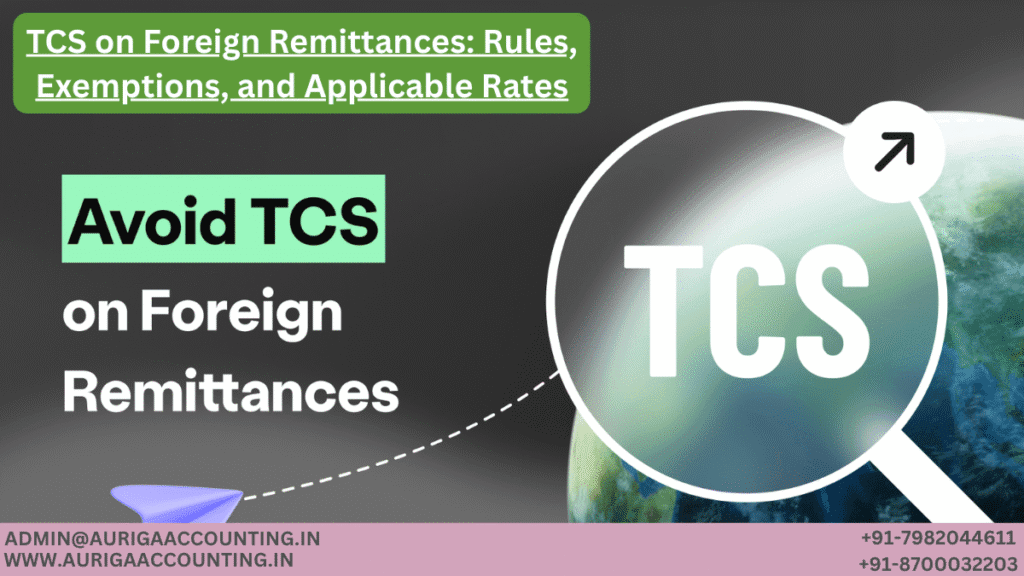Dinesh Pandiyan is a seasoned content writer with expertise in business registration, tax compliance, trademark regulations, and corporate law. His well-researched articles offer practical, easy-to-understand guidance, helping entrepreneurs confidently navigate complex legal and regulatory frameworks.

TCS on Foreign Remittances: Rules, Exemptions, and Applicable Rates
Introduction
ToggleUnderstanding the expenses tied to foreign remittances is essential for Indian residents. These expenses can include transfer fees with applicable GST, exchange rate markups, and Tax Collected at Source (TCS)—a tax deducted on overseas transfers beyond specified limits. Since October 2020, TCS applies to international remittances under the Liberalised Remittance Scheme (LRS) for amounts exceeding ₹7 lakhs in a financial year. This article explores the key aspects of TCS on foreign remittances, including its applicability, exemptions, prevailing rates, and compliance obligations. Ensure smooth tax compliance and simplify your filings with expert support from IndiaFilings!
What is TCS on Foreign Remittances?
Tax Collected at Source (TCS) on foreign remittances is a tax mechanism implemented to track and regulate significant outward remittances under the Liberalised Remittance Scheme (LRS). It applies to transactions such as overseas education, foreign travel, and investments abroad. TCS rates vary based on the purpose of the remittance and are collected by authorised dealers at the time of transfer. This amount is adjustable against your final income tax liability and is intended to improve transparency in international financial transactions.
When is TCS Deducted on Foreign Remittances?
TCS on foreign remittances becomes applicable under LRS when the remittance amount exceeds prescribed thresholds, depending on the transaction type. Here are common scenarios where TCS applies:
Foreign Tour Packages: TCS is applicable on payments for travel, accommodation, and related expenses abroad.
Online Purchases from Foreign Websites: Buying goods or services from international e-commerce platforms triggers TCS.
Investments Abroad: Transferring funds for foreign mutual funds, bonds, or other assets incurs TCS.
Loans or Gifts to Relatives Overseas: Monetary gifts or loans to family abroad are subject to TCS.
Buying Foreign Stocks: Remittances for purchasing equity shares in foreign companies are liable for TCS.
Purchasing Overseas Property: Sending money to buy property abroad attracts TCS.
Funds to Foreign Bank Accounts: Sending money to your own foreign bank account while residing overseas also attracts TCS if it exceeds LRS limits
TCS Rates on Foreign Remittances (Effective from 1st October 2023)
| Sr. No. | Nature of Remittance | Earlier Rate | Revised Rate |
|---|---|---|---|
| (i) | Education funded by an approved loan | Nil up to ₹7 lakh; 0.5% above ₹7 lakh | No change |
| (ii) | Medical treatment or self-funded education | Nil up to ₹7 lakh; 5% above ₹7 lakh | No change |
| (iii) | Other purposes under LRS | Nil up to ₹7 lakh; 5% above ₹7 lakh | 20% above ₹7 lakh |
| (iv) | Overseas tour packages | 5% (no threshold) | 5% up to ₹7 lakh; 20% above ₹7 lakh |
How to Check TCS Deducted on Remittances
To ensure accurate compliance, regularly monitor your TCS deductions through these methods:
Form 27D: This certificate is issued by the remittance service provider as proof of TCS deduction and payment.
Form 26AS: Accessible on the Income Tax e-portal, this consolidated tax statement lists all TDS and TCS entries for the financial year.
AIS & TIS: The Annual Information Statement (AIS) and Taxpayer Information Summary (TIS) offer comprehensive details of financial transactions, including TCS
How to Claim a TCS Refund on Foreign Remittances
If the TCS collected exceeds your actual tax liability, you can claim a refund while filing your Income Tax Return (ITR). Follow these steps:
Collect Form 27D: Obtain this certificate from your remittance provider.
Verify Details in Form 26AS: Ensure the TCS amount matches your official tax records.
File ITR: Include the TCS under the appropriate section when filing your return.
Refund Processed: After submission, the IT Department will review your claim and issue a refund if applicable
Consequences of Non-Compliance
Failure to comply with TCS provisions can result in:
Penalties and interest for underpayment or delayed payment
Increased scrutiny from the Income Tax Department
Possible legal action for providing false or incomplete information
About the Author
shivani
February 20, 2026
new
January 1, 2026
January 1, 2026
January 1, 2026
December 31, 2025
December 27, 2025
December 27, 2025
December 26, 2025
December 26, 2025
December 25, 2025
December 25, 2025
December 24, 2025
December 16, 2025
November 29, 2025
November 20, 2025
June 16, 2025
June 16, 2025
June 16, 2025
June 16, 2025
June 14, 2025
June 14, 2025
June 14, 2025
June 14, 2025
June 13, 2025
June 13, 2025
June 13, 2025
June 11, 2025
June 9, 2025
June 9, 2025
June 9, 2025
May 31, 2025
May 30, 2025
May 29, 2025
May 27, 2025
May 26, 2025
May 26, 2025
May 24, 2025
May 14, 2025
December 29, 2023
October 18, 2023
October 9, 2023
RELATED ARTICLES
How to Create...
FSSAI Compliance...
Key Benefits...
Which Types...
Formation...
A Complete...
Advantages...
Expedite the...
No posts found












